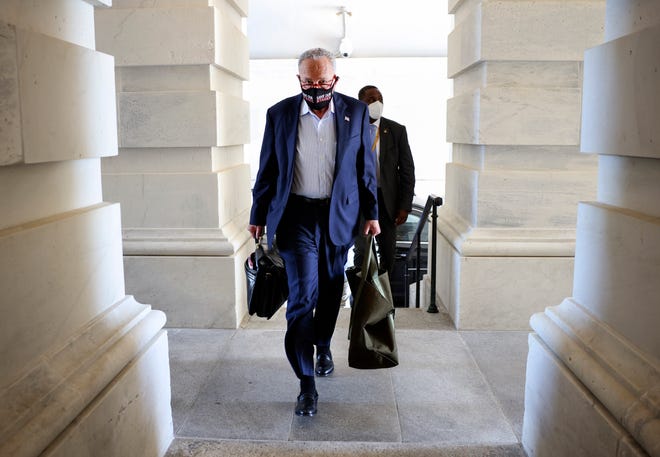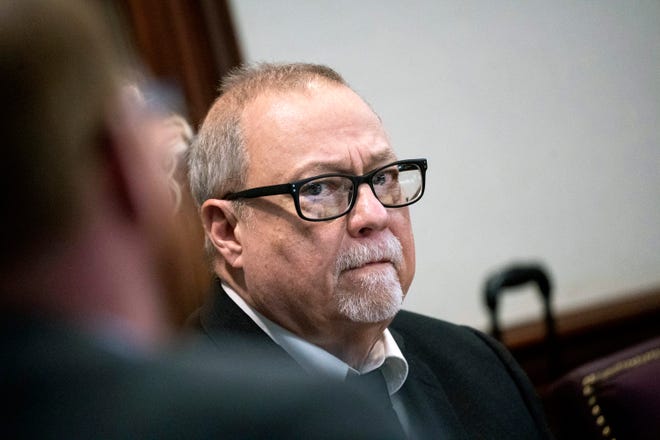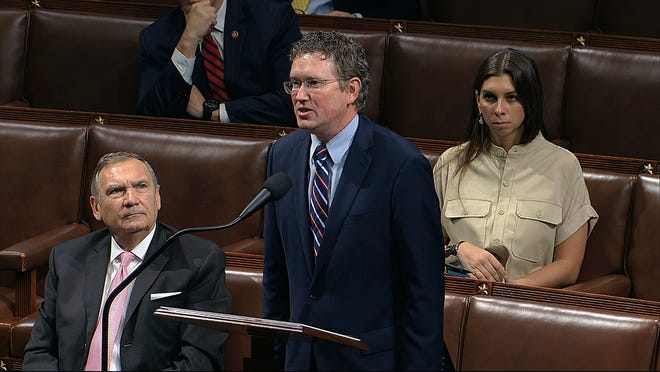
WASHINGTON – Congressional Democrats are scrambling Tuesday to extend funding for the federal government with less than 72 hours left to avoid a shutdown.
A possible shutdown would happen at the start of the fiscal year Friday if a bill to fund the government doesn't pass both the House and Senate.
Senate Republicans blocked a Democratic effort to combine government funding with an increase in the amount the country can borrow.
The debt limit, which the country is projected to reach in mid-October, is another pending crisis. Democrats contend it’s irresponsible to block an increase in the debt limit, but Republicans contend the Democrats must approve it on their own.
Senate Minority Leader Mitch McConnell, R-Ky., proposed Monday to vote on government funding alone, without an increase in the debt limit. But he needed unanimous consent to debate the proposal and Democrats objected.
More:Congress is weeks away from a debt crisis that could lead to default. Is it time to panic?
Treasury Secretary Janet Yellen warned Congress on Tuesday the country would reach the debt limit Oct. 18. She urged lawmakers to protect the full faith and credit of the country "as soon as possible."
House Speaker Nancy Pelosi, D-Calif., and Senate Majority Leader Chuck Schumer, D-N.Y., each said they would take further action this week to extend funding before the new fiscal year begins Friday. Work on the debt limit could require more time and debate.
“This isn’t your typical Washington fracas and it shouldn’t be treated as such,” Schumer said. “It has far more severe consequences than the typical political catfight.”

Besides overall government funding and debt, lawmakers face votes on infrastructure and President Joe Biden's social welfare priorities this week.
Psaki: White House hopes McConnell ‘gets out of the way’ on debt ceiling issue
White House Press Secretary Jen Psaki said Tuesday that Senate Majority Leader Chuck Schumer is pursuing different paths Senate Democrats can take as Republicans refuse to help raise, or suspend, the debt ceiling.
Senate Minority Leader Mitch McConnell, R-Ky., has said for months Republicans will not help Democrats. Republicans also blocked a funding bill Monday that not only addressed raising the debt limit but also extended funding for the federal government.
“It’s also our hope, if Senator McConnell isn’t going to help us avoid a default and a shutdown, at least he’ll get out of the way and let Democrats do it alone so we can avoid a default. So, right now, that question remains up in the air,” Psaki said.
Democrats are scrambling to avoid a looming government shutdown on Thursday, and a default later in October, without the help of their GOP colleagues.
Schumer on Tuesday asked for unanimous consent to hold a Senate vote to suspend the debt limit with a majority, or 51-vote threshold, to avoid the Senate filibuster. However, McConnell objected.
Now the number of ways they can address the issue are dwindling. One way, without Republican votes, is if Democrats pursued it through budget reconciliation, by attaching the debt ceiling measure to a larger budget bill Democrats are planning to pass. That bill would not need any GOP support in the Senate, but leaves Democrats short on time to get it done.
-- Savannah Behrmann
Senate at an impasse on raising the debt limit
Senate Majority Leader Chuck Schumer, D-N.Y., said he would propose legislation Tuesday to suspend the country’s limit on borrowing.
But it would require unanimous consent to debate the measure and Sen. Ted Cruz, R-Texas, said he would object.
Schumer said Republicans raised the debt limit on their own years ago, with the consent of Democrats. So he said he would try that strategy again.
“It’s a straightforward proposition: if Republicans really want to see the debt ceiling raised without providing a single vote, I’m prepared to hold that vote,” Schumer said. “After last night, it is clear insanity and disaster are now the Republican party line – and it’s endangering the very bedrock upon which both our economic viability and financial credibility stand.”
But Republicans have suggested Democrats raise the debt limit as part of their $3.5 trillion package of social welfare programs. Democrats have been reluctant to do that because it would link borrowing for previous spending decisions with the package of President Joe Biden’s priorities that have not yet been approved.
“It's a game. It won't work. Schumer knows it won't work,” Cruz said. “But he's happily playing the game right now. When this fails, I fully expect that Schumer is going to surrender.”
The path to “surrender” isn’t clear.
Sen. Dick Durbin of Illinois, the second-ranking Democrat in the chamber, said the strategy is also “a non-starter” because it would take several weeks to cross legislative hurdles. Treasury Secretary Janet Yellen warned Congress on Tuesday the country’s borrowing authority will be exhausted Oct. 18.
– Bart Jansen
Nancy Pelosi: Plans to avoid government shutdown, raise debt ceiling could come today
House Speaker Nancy Pelosi, D-Calif., said new legislative proposals to avoid a government shutdown and raise the nation's borrowing ability could come as early as Tuesday.
Funding for the federal government expires Thursday at the end of the fiscal year. Treasury Secretary Janet Yellen warned Congress on Tuesday that the country will reach its debt limit Oct. 18.
Lawmakers also face a Thursday vote on $1.2 trillion infrastructure legislation while negotiations continue over details of a $3.5 trillion bill that includes most of Biden's domestic agenda.
But she said infrastructure and the larger package would both be approved.
“We will pass both bills,” she said.
Lawmakers are debating how to avoid future votes on the debt limit. One option is from Rep. Brendan Boyle, D-Pa., who proposed legislation with House Budget Committee Chairman John Yarmuth, D-Ky., to give the Treasury secretary authority to raise the debt limit, which Congress could then vote to reject.
– Bart Jansen
Janet Yellen says US debt will be exhausted Oct. 18 as Congress seeks to raise debt limit
Treasury Secretary Janet Yellen warned Congress on Tuesday that the country will reach its limit on borrowing on Oct. 18.
The department has been taking extraordinary measures for months to avoid defaulting on its debts. The steps include not funding civil service and postal service retirement programs. But those measures will be exhausted, leaving “very limited resources that will be depleted quickly.”
“It is uncertain whether we could continue to meet all the nation’s commitments after that date,” Yellen wrote in a letter to leaders of both parties in Congress and on the tax-writing committees. “The full faith and credit of the United States should not be put at risk.”
She has already warned of catastrophic consequences if the country were to default on its loans. Just edging up the deadline can cause “serious harm to business and consumer confidence, raise borrowing costs for taxpayers and negatively impact the credit rating for the United States for years to come,” she wrote.
– Bart Jansen
House to vote Thursday on bipartisan infrastructure bill
Another piece of legislation expecting a House vote this week is the $1.2 trillion infrastructure bill, which includes $550 billion in new funding that the Senate has already approved.
The bipartisan infrastructure bill enjoys broad support. But progressive House Democrats have insisted that it move in tandem with a $3.5 trillion package of Biden's priorities, which is still under negotiation between the House and Senate.
A group of nine moderate House Democrats got a commitment to vote Monday on infrastructure, whether the larger package was finished or not. The deadline slipped to Thursday, but a leader of the moderates, Rep. Josh Gottheimer, D-N.J., said it wouldn’t slip again.
“We're going to have a big week. We're going to bring the infrastructure bill to the floor, which she talked about, and we're going to have the votes,” Gottheimer said. “And we're going to continue doing what we’ve been doing, which is working on” the $3.5 trillion package.
More:History shows why moderate Democrats may be hesitant about Biden's agenda as 2022 elections loom
The Senate has already approved the infrastructure bill, so House approval would send it to Biden. The chairman of the House Transportation and Infrastructure Committee, Rep. Peter DeFazio, D-Ore., called it the largest investment in transit ever and the biggest investment in passenger railways since the creation of Amtrak, the most bridge investment since the creation of the interstate highway system and the largest investment in drinking water and wastewater in history.
“Americans are tired of potholes damaging their cars, failing bridges, decrepit transit, trains that derail, water mains that explode, sewer systems that back up into their basement and pollute our rivers,” DeFazio said.

Democrats haggle over $3.5T for Biden agenda
Dozens of progressive Democrats have threatened to oppose the infrastructure bill – and potentially reject it – if it moves without the $3.5 trillion package.
Though Pelosi appeared positive Monday.
“Our members are so idealistic, strategic, and interested in getting results,” Pelosi said after a meeting with Democratic Caucus members Monday evening. “It was a beautiful meeting. I’m so proud of them.”
The head of the Progressive Caucus, Rep. Pramila Jayapal, D-Wash., said after the meeting she wants to see where negotiations on the $3.5 trillion package stand before the vote on infrastructure.
More:Congress enters 'eventful week': Infrastructure vote, government shutdown possible
Key senators have urged less spending and taxation. Sens. Joe Manchin, D-W.Va., and Kyrsten Sinema, D-Ariz., who each said the $3.5 trillion price tag is too high, are expected to meet with Biden again Tuesday at the
But progressives say they should spell out what should be cut from the proposal such as providing universal prekindergarten and community college, paid family and medical leave, and an expansion of Medicare.
“Let's get through the step of getting the actual legislative text, the agreement from the Senate,” Jayapal said. “Then we can talk about everything else. But some of it depends on what that conversation is like. What is the commitment, other than a vote that’s not going to be held up?”
Another progressive Democrat, Rep. Ilhan Omar of Minnesota, said she is optimistic that enough work on the larger package will have been completed so that she can support the infrastructure bill on Thursday. She hopes that meetings continuing Tuesday will lead to greater agreement on what can pass both the House and Senate.
“I think all of that is gamed out we will be in a better position to make a decision how we move forward,” Omar said.
Source link








